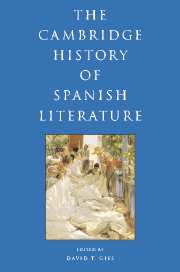Book contents
- Frontmatter
- I INTRODUCTION
- II HISTORY AND CANONICITY
- III THE MEDIEVAL PERIOD
- IV EARLY MODERN SPAIN: RENAISSANCE AND BAROQUE
- V THE ENLIGHTENMENT AND NEOCLASSICISM
- VI THE FORGING OF A NATION: THE NINETEENTH CENTURY
- 22 Romanticism in Spain
- 23 The theatre in Romantic Spain
- 24 Mariano José de Larra
- 25 Romantic poetry
- 26 Romantic prose, journalism, and costumbrismo
- 27 Benito Pérez Galdós
- 28 The Realist novel
- 29 The Naturalist novel
- 30 The theatre in Spain 1850–1900
- 31 Poetry in the second half of the nineteenth century
- VII THE MODERN, MODERNISMO, AND THE TURN OF THE CENTURY
- VIII TWENTIETH-CENTURY SPAIN AND THE CIVIL WAR
- IX IN AND OUT OF FRANCO SPAIN
- X POST-FRANCO SPANISH LITERATURE AND FILM
- Bibliography
- Index
- References
28 - The Realist novel
from VI - THE FORGING OF A NATION: THE NINETEENTH CENTURY
Published online by Cambridge University Press: 28 March 2008
- Frontmatter
- I INTRODUCTION
- II HISTORY AND CANONICITY
- III THE MEDIEVAL PERIOD
- IV EARLY MODERN SPAIN: RENAISSANCE AND BAROQUE
- V THE ENLIGHTENMENT AND NEOCLASSICISM
- VI THE FORGING OF A NATION: THE NINETEENTH CENTURY
- 22 Romanticism in Spain
- 23 The theatre in Romantic Spain
- 24 Mariano José de Larra
- 25 Romantic poetry
- 26 Romantic prose, journalism, and costumbrismo
- 27 Benito Pérez Galdós
- 28 The Realist novel
- 29 The Naturalist novel
- 30 The theatre in Spain 1850–1900
- 31 Poetry in the second half of the nineteenth century
- VII THE MODERN, MODERNISMO, AND THE TURN OF THE CENTURY
- VIII TWENTIETH-CENTURY SPAIN AND THE CIVIL WAR
- IX IN AND OUT OF FRANCO SPAIN
- X POST-FRANCO SPANISH LITERATURE AND FILM
- Bibliography
- Index
- References
Summary
No one alive today has significant personal memories of Juan Valera (1824–1905), Pedro Antonio de Alarcón (1833–1891), José María de Pereda (1833–1906), or Leopoldo Alas “Clarín” (1852–1901). No active scholar or critic can recall Benito Pérez Galdós (1843–1920), Narcís Oller (1845–1930), Emilia Pardo Bazán (1851–1921), Jacinto Octavio Picón (1852–1923), Armando Palacio Valdés (1853–1938), or José Ortega Munilla (1856–1922). By contrast there are still great numbers of persons, in Spain and abroad, whose literary consciousness was formed by generations of novelists, critics, and teachers hostile or, at best, indifferent to much of Spanish culture between the late seventeenth century and the Restoration period. Especially unattractive to these Modernists, Vanguardists, and Postmodernists was and continues to be the Realist imperative to create socio-mimetic fictions centered on the typical or representative people, manners, conflicts, and particular times, places, and settings of regional and national life.
Hence, against the historically and societally homologous fictions of Scott, Balzac, Dickens, Thackeray, Tolstoy, Twain, and the Spanish Realists, there arose early in the twentieth century an opposed way of thinking about all genres of art. Since then this mindset has remained potent. A reminder of its prestige and force was the October 2001 death of the last surviving Spanish Surrealist, Eugenio F. Granell (b. 1914). In a necrological piece in the Madrilenian newspaper La Razón, César Antonio Molina cited from Granell’s essay, “Apuntes sobre el realismo artístico” (“Notes on Artistic Realism,” 26 October): “La realidad mayor en el arte es una independencia absoluta de la vida cotidiana y sus acciones. El arte está fuera de lo diario al hacerse eterno – al hacerse arte y al margen de lo accidental” (“The greatest reality in art is an absolute independence from daily life and its actions. Art is beyond the daily upon making itself eternal – upon making itself art and beyond what is accidental”).
- Type
- Chapter
- Information
- The Cambridge History of Spanish Literature , pp. 410 - 422Publisher: Cambridge University PressPrint publication year: 2005
References
- 1
- Cited by

